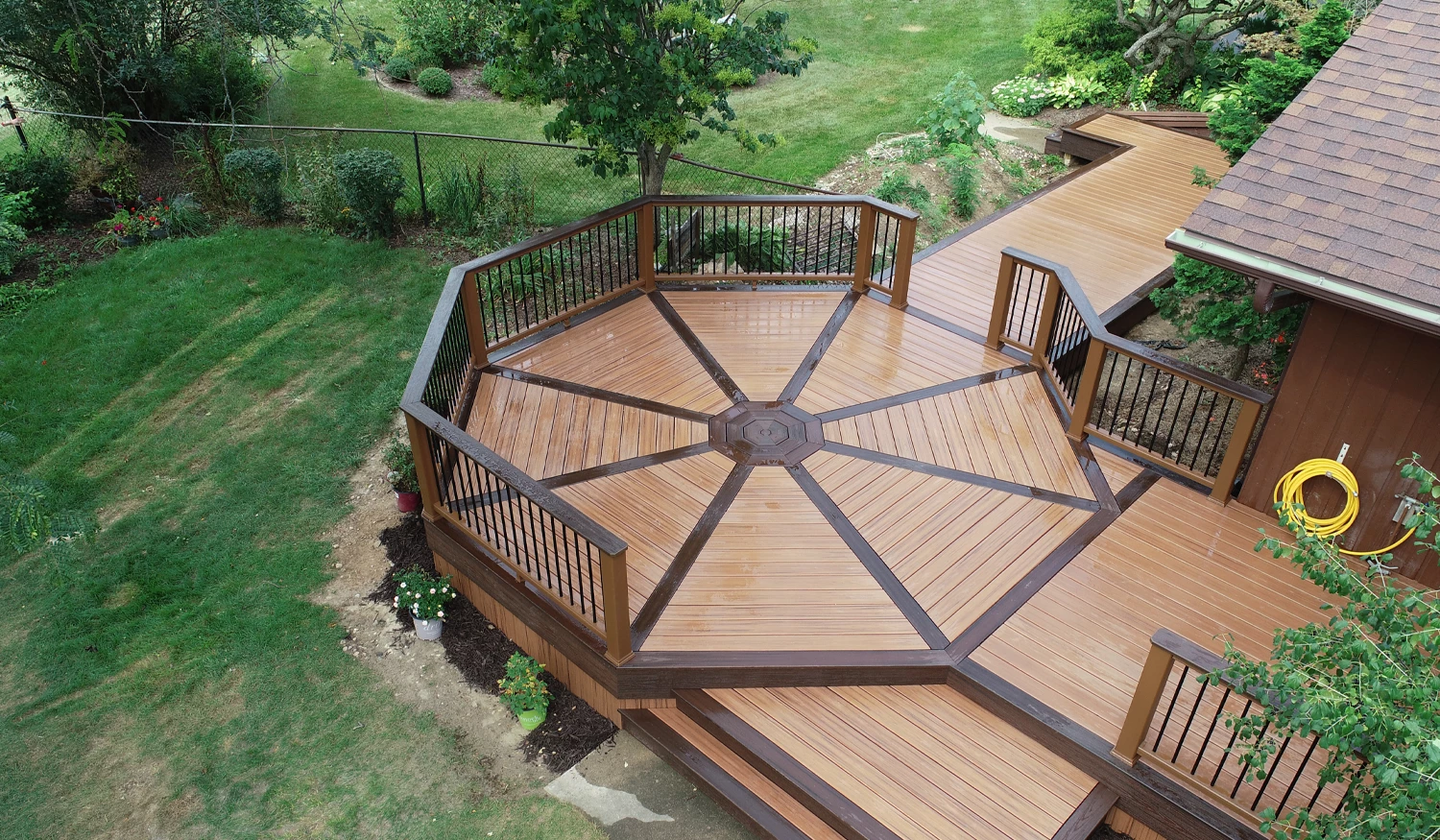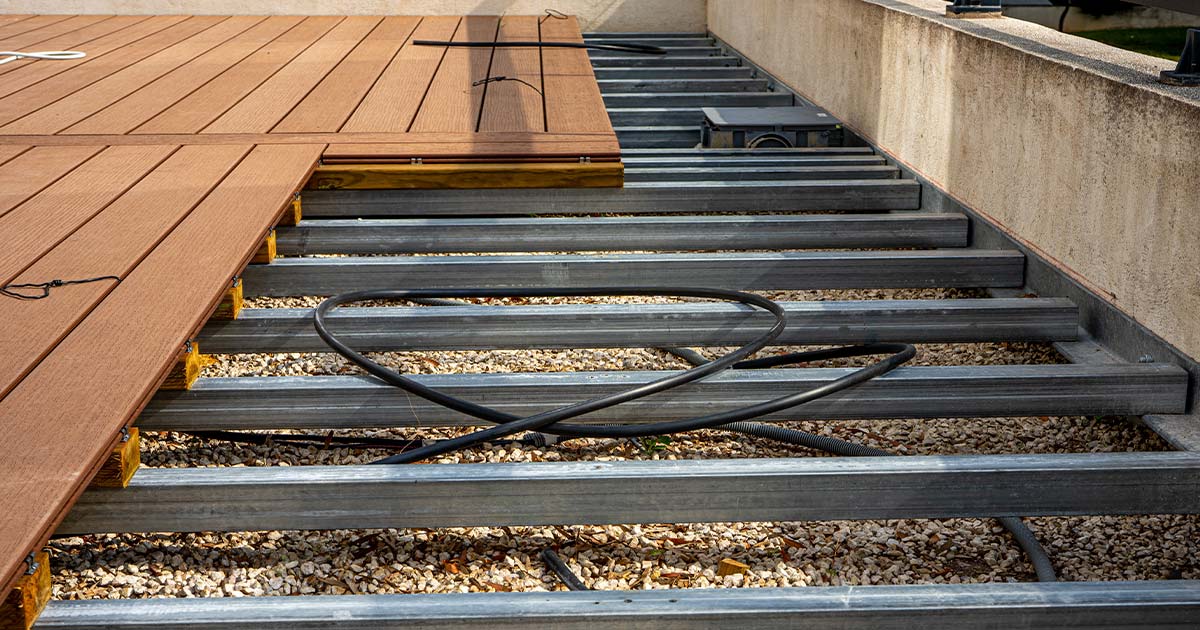Property owners love the value that comes with professional deck installation Austin TX services.
Property owners love the value that comes with professional deck installation Austin TX services.
Blog Article
Exactly how to Pick the Right Materials for Your Deck Installation Job
Choosing the ideal materials for your deck installation task can seem daunting. There are numerous variables to think about, from sturdiness and maintenance to aesthetic appeals and environmental influence. The choice between standard timber and composite products, each with its very own collection of benefits and disadvantages, can be especially difficult. The secret is to balance your budget, design choices, and way of living requires to produce a deck that will boost your exterior area for many years to come.
Understanding the Various Types of Deck Products
When starting a deck setup project, the selection of materials comes to be an essential decision. Numerous choices are readily available, each with special qualities and visual charm. Typical wood, for example, uses a timeless, all-natural look and is commonly much more cost-effective. Nevertheless, it can warp over time and calls for regular maintenance. Compound materials, on the other hand, are a blend of wood and plastic, giving toughness and resistance to weather elements. They demand much less maintenance compared to wood yet are generally more pricey. Another choice is plastic, which is virtually maintenance-free and resistant to bugs and rot, albeit much less natural-looking. By understanding these differences, house owners can make an extra informed decision on the most appropriate deck product for their details needs.
Assessing the Toughness and Upkeep Demands of Deck Materials
Assessing the longevity and upkeep demands of deck products is an important action in deck installation. Durability entails the material's ability to endure rough weather condition problems, wear and tear, and its durability.
Recognizing maintenance needs is equally crucial. Some materials need normal sealing or tarnishing to maintain their look and stand up to wetness damages, while others, like composite decking, demand much less upkeep. By examining these elements, one can choose the most ideal decking material, making certain a balance in between durability, maintenance requirements, and visual appeal.
Cost Evaluation: Contrasting Timber and Composite Decking
Although expense might originally look like an additional worry, it is a considerable aspect when contrasting timber and composite decking. Wood, typically a much less pricey alternative, has a reduced upfront cost. Nevertheless, gradually, upkeep expenditures can accumulate, potentially making wood more expensive in the lengthy run. These maintenance costs may include staining, sealing, or replacing harmed boards. On the various other hand, composite outdoor decking, while costlier originally, calls for much less upkeep, potentially decreasing long-lasting costs. It's essential to bear in mind that composite outdoor decking isn't invulnerable to wear and tear, and substitute prices can be high. Prospective deck proprietors need to consider their budget and willingness to keep their decks when choosing between timber and composite decking.
Aesthetic Appeals and Layout Versatility of Decking Products
While expense is an important factor to consider, the visual allure and design flexibility of outdoor decking materials also play a significant function in the decision-making process. Various products offer varying degrees of visual appeal. As an example, all-natural timber decking supplies a timeless, timeless look, while composite products supply a broad variety of shades and appearances to suit diverse tastes and designs. Design flexibility refers to the ability to shape and manipulate the decking product to fulfill details layout needs. Timber, as an example, uses high style versatility because of its ease of cutting and forming. Compound materials, while less flexible in layout, are still versatile sufficient for a lot of deck designs. These factors, deck installation austin tx as a result, are critical components in the choice of decking product.
Environmental Effect of Decking Materials
When choosing decking products, one should consider not just appearances and toughness, but additionally the environmental influence. It is essential to analyze the sustainability of materials and discover recycled decking choices. Comprehending the possible impact on regional ecological communities will guarantee an extra eco responsible option.
Examining Product Sustainability
In the world of deck construction, evaluating product sustainability is a crucial step. This involves assessing the environmental influence of each possible material, thinking about elements such as the power needed for its manufacturing, its carbon impact, and its end-of-life disposal or reusing alternatives. For example, wood is a sustainable resource, however unsustainable logging techniques can lead to deforestation. Composite outdoor decking products commonly integrate wood and plastic, decreasing the demand for brand-new lumber however enhancing reliance on fossil gas. Light weight aluminum and other metals might be a lot more resilient and recyclable, but their removal and handling can be energy-intensive. Thus, the choice of outdoor decking materials should stabilize performance, appearances, her latest blog expense, and sustainability to guarantee a responsible and durable setup.
Recycled Decking Choices

Composite decking is specifically popular because of its resilience and simplicity of upkeep. It's resistant to rot, bugs, and fading, making it a durable choice. Recycled plastic outdoor decking, on the various other hand, is highly durable and needs very little maintenance. While these materials might lug a greater initial cost, their durability and lowered ecological impact make them a wise investment for the eco-conscious house owner.

Impact on Local Ecological Communities
While the advantages of making use of recycled products for decking can not be overemphasized, it's just as crucial to think about the wider find out environmental implications of these choices. Proper disposal of old decking is important to minimizing garbage dump waste. Essentially, an eco-conscious deck job needs cautious material selection, lasting sourcing, and accountable disposal.
Making Your Last Decision: Tips for Choosing the very best Deck Products
As the write-up changes right into the subtopic of "Making Your Decision: Tips for Selecting the Best Deck Products", it is vital to comprehend the range of deck products available. Striking a balance between longevity and looks is vital in this choice process. The complying with discussion will guide readers in making an informed option based upon these essential factors to consider.
Understanding Various Deck Materials
The job of picking the appropriate products for your deck setup can appear daunting as a result of the large array of choices readily available. Recognizing the various products can simplify this process. Timber is a popular selection, using a classic visual and cost. Sorts of wood made use of consist of pressure-treated lumber, cedar, and redwood. Composite materials, made from a blend of wood and plastic, are low-maintenance and resistant to rot and pests. Plastic or PVC decks are even extra sturdy and require much less upkeep than composite materials, however they can look much less all-natural. Light weight aluminum decks are solid, light-weight, and resistant to rot, however they are likewise the most expensive choice. Each product has its own advantages and disadvantages, making it crucial to consider your particular needs prior to making a last choice.
Toughness vs. Looks Balance
Balancing toughness with aesthetic appeals can be a challenge when choosing deck materials. The decision commonly comes down to personal choices and the deck's planned usage. High-traffic areas may necessitate resilient materials like composite decking, which stands up to damage yet might do not have the all-natural elegance of timber. On the other hand, wood supplies a classic charm and warmth that artificial products struggle to reproduce. However, it calls for more upkeep and may not last as long. Home owners need to strike a balance, taking into consideration both the deck's practical demands and their visual choices. By doing so, they can guarantee their deck remains a functional and eye-catching outdoor room for many years to find.
Verdict
Finally, choosing the best materials for your deck installment project needs mindful factor to consider of elements such as durability, upkeep, expense, visual appeals, and environmental effect. Whether you choose for typical wood or composite products, your selection should align with your spending plan, design preferences, and way of living. Eventually, the ideal decking material is one that improves your outside space and offers pleasure for several years ahead.
Report this page